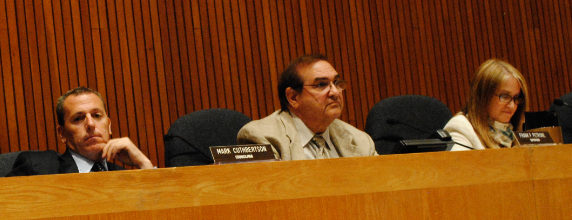- Home
- Events
- Investigations
- News
- OPINION
- Police/Fire/EMS
- Politics
- Sports & Schools
Experts State Mark Cuthbertson Clearly Violated Ethics Code
 Although the Town of Huntington Ethics Board cleared Councilman Mark Cuthbertson of wrongdoing, many experts in the ethics field state that the Huntington Ethics Board, chaired by Howard Glickstein simply got it wrong. As reported in Newsday, Mark Cuthbertson was appointed a “Receiver” of a foreclosed commercial property, in Islandia, NY. The property manager for this location was Oheka Castle owner Gary Melius. As Receiver, Mark Cuthbertson made over $100,000.00 from this one property. Melius, as property manager received over $77,000 in payments. During the same time Councilman Mark Cuthbertson voted on a zoning change for the Oheka Castle property, of which Melius owns. The change of zone allows for the development of condominiums on the property. Cuthbertson and the Ethics board say that the Cuthbertson/Melius relationship was “parallel” in nature and not considered a conflict.
Although the Town of Huntington Ethics Board cleared Councilman Mark Cuthbertson of wrongdoing, many experts in the ethics field state that the Huntington Ethics Board, chaired by Howard Glickstein simply got it wrong. As reported in Newsday, Mark Cuthbertson was appointed a “Receiver” of a foreclosed commercial property, in Islandia, NY. The property manager for this location was Oheka Castle owner Gary Melius. As Receiver, Mark Cuthbertson made over $100,000.00 from this one property. Melius, as property manager received over $77,000 in payments. During the same time Councilman Mark Cuthbertson voted on a zoning change for the Oheka Castle property, of which Melius owns. The change of zone allows for the development of condominiums on the property. Cuthbertson and the Ethics board say that the Cuthbertson/Melius relationship was “parallel” in nature and not considered a conflict.
Prior to voting to approve the Oheka change of zone, Cuthbertson never revealed his business relationship with Melius, who, according to Newsday is his largest campaign contributor. See Newsday article here: “Huntington Councilman Mark Cuthbertson didn’t disclose ties to Gary Melius”
Even though the Huntington Ethics Board rendered a decision of no conflict, many other professionals and attorneys state otherwise. Glickstein and other members of the Ethics Board have contributed money directly to Cuthbertson’s campaign.
In the Newsday article above, a Professor from Hofstra University, Monroe Freedman said Cuthbertson’s failure to disclose his ties to Melius clearly violated the town code. “It’s hard to see it as anything other than a violation,”he said.
Pace Law School Professor, Bennett Gershman’s stated in a Newsday article that “If there is no compliance it raises serious questions about whether there are corrupt relationships,”
A more recent legal opinion was offered by Attorney Darrin Berger. That opinion was sent to Councilman Gene Cook on 12/29/14 with examples of case law to show that there is a clear violation of ethics committed by Councilman Mark Cuthbertson. Mr. Berger states:
“The Town of Huntington prides itself in enacting the most stringent and demanding Ethical Code of any local government on Long Island. However, this concept becomes abstract when the purposes and intent of this Code of Ethics is distorted by political influence.
The request by Mark Cuthbertson for an ethics opinion after being caught with his hands in the cookie jar smacks of an intricate public relations attempt at damage control. Cuthbertson’s solicitation of the Town of Huntington Ethics Board to whitewash his violation of ethical standards calls into question the independence of the Ethics Board.
The Town of Huntington Ethics Code was enacted to “codify the policy of requiring the highest standards of ethical and professional conduct” by those engaged in public service. The overriding purpose of enacting this Code of Ethics is to require “the highest levels of honesty, integrity and propriety” “by . . . . . those who choose to engage in public service to the populace of the Town of Huntington. . . .” § 29-2 Code of Ethics of Town of Huntington.
Given the exalted purposes the Code of Ethics aspires to, specified standards of conduct are set forth upon which to gauge whether those engaged in public service are acting with “the highest level of honesty, integrity and propriety” as an elected Town Official.
These standards prohibit any Town Board member from engaging in a conflict of interest. § 29-5(A) Code of Ethics Town of Huntington.
These standards also prohibit a Town Board member from giving the appearance of impropriety in discharging their official duties. § 29-5(B) Code of Ethics Town of Huntington. An appearance of impropriety occurs when a government official allows an outside relationship to influence their conduct or judgment in relation to their official duties. § 29-5(B)(1) Code of Ethics Town of Huntington. The appearance of impropriety also occurs when a Town Board member engages in conduct that raises “suspicion among the public that they are likely to be engaged in acts that are in violation of their trust.” § 29-5(B)(5) Code of Ethics Town of Huntington.
Finally, the standards prohibit the Town Board member from engaging in conflicting employment or business transaction where “independence of judgment in the exercise of their official duties” will be impaired “in any manner whatsoever.” § 29-5(C)(1) Code of Ethics Town of Huntington.
The Ethics Opinion of Howard Glickstein, Chair of the Town of Huntington Ethics Board, scruptiously avoids citing the purposes of and standards to be adhered to in the Code of Ethics while endeavoring to juxtapose Cuthbertson’s ethical lapses against a section of the Code of Ethics, arguably inapplicable, to sanitize his violation of ethical standards.
The Ethics Opinion of Howard Glickstein superficially delves into the legal criteria governing the duties and responsibilities of a Receiver in Foreclosure. Whether the superficial result of the Ethics Opinion was intentional or the product of poor research can be debated. But given that the opinion was written by a Dean of a Law School should cause a reasonably objective person to suspect that the standards that should have been applied in order to render a meaningful opinion were willfully ignored.
Howard Glickstein’s Opinion merely recites the fiduciary capacity in which a Receiver in Foreclosure serves and suggests that such fiduciary duty limits the receiver’s fealty to the foreclosing bank and other parties. The fiduciary capacity in which a receiver serves is only the tip of the iceberg. The opinion fails to mention that the duty to maintain the property shifts to the Receiver as part of the foreclosure proceedings. Fourth Federal Savings Bank v. 32-22 Owners Corp., 236 AD2d 300. The Receiver has a legal duty to maintain the property in good repair and is liable for any damage that results from the failure to meet that duty. General Obligations Law § 9-101. Moreover, the Receiver in Foreclosure occupies the same position as the owner of the building being foreclosed upon for a variety of purposes. Canale v. New York State Department of Taxation, 84 Misc.2d 786.
A Receiver’s duty is to preserve and operate the property within the confines of the Order of appointment. Knickerbocker Ice Co. v. Benson, 155 Misc. 738,740; General Obligations Law § 9-101.
Since the Receiver in Foreclosure steps into the shoes of the owner, the Receiver appointed by the Court acts as a principal and on his own responsibility and credit. Vilas v. Page, 106 NY 439, 451. Thus, any entity or person appointed or employed in furtherance of preserving the property must look to the Receiver for payment and must competently preserve the property as the Receiver would bear the ultimate liability for failure to do the same. Meyer v. Lexow, 1 AD 116, 117; General Obligations Law § 9-101.
Thus, the Ethics Opinion omits the essential legal responsibilities assumed by a Receiver upon his appointment by a Court. These responsibilities are far ranging, create potential individual liability on the part of the Receiver and are in addition to any fiduciary duty the Receiver may have under the law.
Given the overriding responsibility Cuthbertson had as a Receiver of a foreclosed commercial building, his relationship to Melius, as Property Manager, was much more intricate and intertwined legally than suggested by the Glickstein Opinion.
The relationship of Cuthbertson, as Receiver, and Melius, as Property Manager, was a direct symbiotic relationship, not attenuated by any fiduciary duty to others, which duty existed independently of their direct relationship to each other. Cuthbertson, as Receiver, was ultimately responsible to the owners of the building, the bank holding the mortgage, and the tenants occupying the building to preserve the property and maintain the property in a habitable condition. Melius, as Property Manager, would be subject to Cuthbertson’s authority and control in discharging his duties as Property Manager as Cuthbertson, as Receiver, stepped into the shoes of the owner of the property upon his appointment as Receiver.
Thus, simply citing the applicable section of the Code of Ethics with respect to the duty to recuse oneself (§ 29-7 Code of Ethics Town of Huntington) is a slipshod analysis of the comprehensive nature of the Code of Ethics. If one of Dean Glickstein’s law students was being graded on this official opinion, the student surely would receive a failing grade.
If the legal nature of the relationship between Cuthbertson, as Receiver, and Melius, as Property Manager, was comprehensively analyzed in the Opinion, a conflict of interest as defined by § 29-5(A) of the Huntington Code of Ethics arguably occurred when Cuthbertson voted on the Melius change of a zone application. Section 29-5(A) of Huntington Code of Ethics provides as follows:
“Conflicts of Interest. No governmental official of the town or any subdivision thereof shall engage in any conduct, business transaction or professional activity, or shall have any financial or other private interest, direct or indirect, which is in substantial conflict with the proper discharge of their official duties.”
At a minimum, Cuthbertson engaged in an appearance of impropriety by voting on the Melius change of zone application without publicly disclosing the conflict of interest presented by his relationship with Melius, as Receiver. This clearly constitutes an ethical lapse and a violation of ethical standards in the Code of Ethics of the Town of Huntington. Cuthbertson’s mea culpa in the form of an abstention on the recycling vote is a tacit admission that his vote on the Melius change of zone raised suspicion among the public that he likely violated his trust when voting thereon in violation of the ethical standard set forth in § 29-5(B)(5) of the Code of Ethics of the Town of Huntington. The Ethics Opinion should have arrived at a similar determination but for the rush to judgment necessitated by political expediency.”





.png)
You must be logged in to post a comment Login